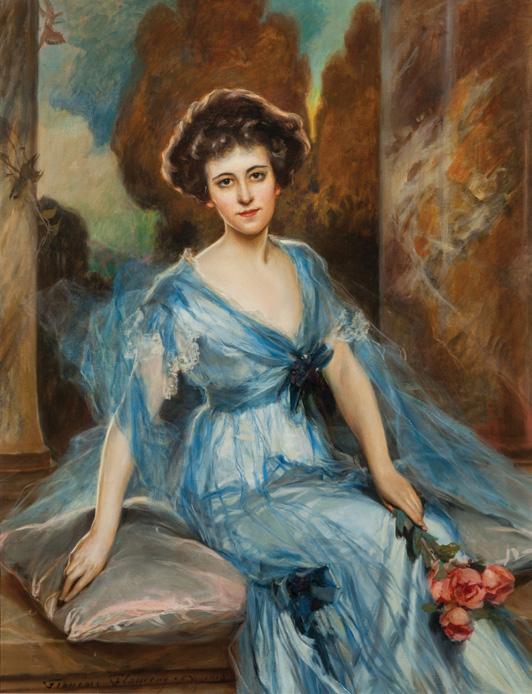THE MARY DUKE BIDDLE FOUNDATION





As the new chair of the Mary Duke Biddle Foundation Board of Trustees, I am beyond fortunate to benefit from the vision and work of my predecessors. Prior to me, past board chairs Chris Harris (my esteemed cousin) and Jon Zeljo (my dear brother) teamed up with remarkable board members and our Executive Director to lead and effect significant changes that position the MDBF to better serve our communities.
We narrowed our scope to focus on the needs of our Triangle community. We re-invented our grant making to support the core needs of area nonprofits by providing operating money (rather than project-based grants) and providing multi-year support. Also, we increased our responsiveness, partnering with the Jenny Lillian Semans Koortbojian Trust to jointly address urgent needs in our community during the pandemic.
None of this could have happened without the leadership of Executive Director Mimi O’Brien. I applaud her for her grace and perseverance in orchestrating fundamental changes at the MDBF.
$510,000, 6 Grants $328,000, 20 Grants $285,000, 32 Grants $230,000, 16 Grants $44,500, 10 Grants
Total: $1,397,500
With Mimi’s gentle nudging the board came to understand that we could better serve our nonprofit partners by providing general operating support rather than project specific support.
We are now saying to our partners, “We believe in your mission; we believe in your organization’s leadership; and we trust you know best how to use our funds to further that mission.”
I am also proud that the MDBF stepped up to meet the challenges created by the pandemic. We realized the pandemic meant we needed to deepen our community support. In response, we temporarily increased the percentage of the foundation’s holdings being distributed, and we used some of that additional funding capacity to support several causes outside our normal orbit of K-12 education and the arts, such as community food relief and housing assistance. We agreed to continue this in 2022 while our community partners emerge from the crisis.
We also changed our methods for checking in with our nonprofit partners. Because many of our grants are relatively small it made sense to reduce the burden of reporting. How much simpler it is to pick up the phone and have a conversation rather than write a report! In the future, I see us becoming even more “user-friendly.”
MDBF has committed to infuse diversity, equity, and inclusion throughout our operations. We have stated an explicit interest in making grants to organizations led by people of color, and we track and report that information (see chart). We have a specific goal to seek out and elect board members who are representative of the communities we serve. While we have made some progress toward this commitment, we recognize we have more to do and this work is ongoing.
As a Duke graduate, I bring my sentimentality for my alma mater to my new role. I got to know many Duke administrators during my time on the Trinity Board of Visitors and as president of the board of the Josiah Charles Trent Memorial Foundation, which funds Duke University faculty and staff projects. The University, too, is emerging from the difficulties of the last two years. Our strategic support for Duke initiatives can ease that transition.
Finally, in January 2022, we welcomed George Biddle, grandson of Mary Duke Biddle, to the board. With more than three decades of experience in crisis response, peace-building, and conflict mitigation, he brings a distinctive expertise and perspective to our work.
With so much to build on, I see my role is not to revolutionize, but to refine. I look forward to 2022.

Durham County $451,000 | 53% ($237,500)
Wake County $185,000 | 27% ($50,000)
Orange County $90,000 | 33% ($30,000)
Chatham County $86,500 | 77% ($66,500)
Total $812,500
Grants to Duke University and to churches not included
We are now saying to our partners, “We believe in your mission; we believe in your organization’s leadership; and we trust you know best how to use our funds to further that mission.”
Although effective vaccinations, continued use of safety protocols, and government support helped to lessen the effects of COVID-19, the consequences of the pandemic persist across our communities. K-12 students again grappled with virtual school, social and emotional strain, and the impact of missed learning. Arts organizations and artists continued to struggle due to the loss of in-person performances, teaching opportunities, and other events. Many families still faced uncertainty regarding work, health, housing, and the ability to meet basic needs.
The Mary Duke Biddle Foundation is humbled by and in awe of nonprofit staffs’ dedication, adaptability, and perseverance as they offered services and programming despite many obstacles. To help organizations meet their missions, MDBF awarded $285,000 in operating support to area K-12 education and arts nonprofits and to organizations that offer housing assistance and emergency relief to individuals and families in need. Several organizations also received support totaling $35,000 from the Jenny Lillian Semans Koortbojian (JLSK) Trust, which partnered with MDBF’s COVID-19 response.
Arts and K-12 Organizations * $105,000 Boomerang Youth, Chapel Hill • $5,000 Bynum Front Porch, Pittsboro • $5,000 Carolina Theatre, Durham • $10,000 Durham Children’s Initiative, Durham • $10,000 ISLA, Chapel Hill • $5,000 Kidzu Children’s Museum, Chapel Hill • $5,000 Loaves and Fishes Ministry, Raleigh • $5,000 Marian Cheek Jackson Center for Saving & Making History, Chapel Hill • $5,000 MENTOR North Carolina, Hillsborough • $5,000 Museum of Durham History, Durham • $5,000 Musical Empowerment, Chapel Hill • $5,000 North Carolina Master Chorale, Raleigh • $5,000 Raleigh Little Theatre, Raleigh • $10,000 Raleigh Symphony Orchestra, Raleigh • $5,000 Read and Feed, Cary • $5,000 SEEDS, Durham • $15,000 Triangle Artworks, RTP • $5,000 Triangle Bikeworks, Chapel Hill • $5,000 Artists and Arts Relief Funds * $30,000 Chatham County Arts Council, Pittsboro • $5,000 Durham Arts Council, Durham • $5,000 Orange County Arts Commission, Hillsborough • $5,000 United Arts Council of Raleigh and Wake County, Raleigh • $15,000 Housing and Community Relief Organizations * $140,000 Central Piedmont Community Action, Siler City • $55,000 Chatham Outreach Alliance (CORA), Pittsboro • $10,000 Chatham Solidarity Fund, Siler City • $10,000 CARIS Foundation, Durham • $20,000
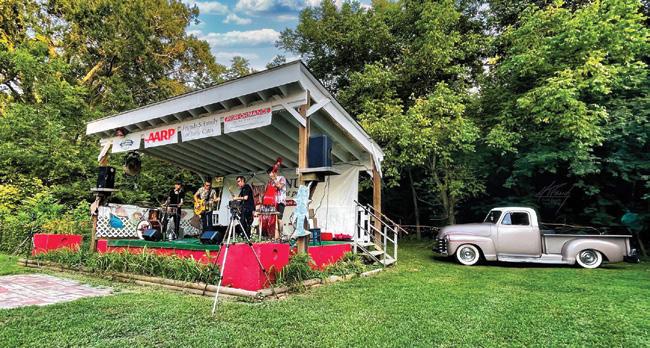
Durham Community Land Trustees, Durham • $2,500 Housing for New Hope, Durham • $2,500 Interfaith Council for Social Service, Hillsborough • $10,000 Senior PharmAssist, Durham (Honoring James D. Semans) • $10,000
Walltown Neighborhood Ministries, Durham • $10,000 Urban Ministries of Durham, Durham • $10,000
Total: $285,000
A core value for MDBF is regularly getting to know nonprofits that are new to us, whether they are start-ups or well-established organizations. We are pleased to highlight six of the 11 organizations to which we made one-year, $5,000 grants for the first time in 2021.
Burning Coal Theatre Company, Raleigh ComMotion – Community in Motion, Raleigh* Diamante Arts & Cultural Center, Raleigh Raleigh Camerata, Raleigh Raleigh Ringers, Raleigh K-12 Education
Audacity Labs, Durham
Augustine Literacy Project of the Triangle, Durham Bull City Performing Arts Conservatory, Durham* GiGi’s Playhouse, Raleigh LatinxEd, Chapel Hill
SwingPals, Durham
Total: $55,000
*Grants made possible through an estate gift to MDBF from the JLSK Trust
a vision to unite communities through Latino arts and culture, Diamante Arts and Cultural Center (DACC) is dedicated to the preservation, development, and promotion of the culture, heritage, and artistic expressions of the diverse Latino and Hispanic communities in North Carolina. DACC organizes activities and programming that develops understanding and appreciation of these communities. “People tend to think because we’re often lumped into one demographic, that we’re homogeneous, and we’re not,” founder Lizette Watko Cruz said. “We’re talking about 20 plus countries with different cultural norms, traditions, beliefs, and gastronomy. Just because one person speaks Spanish doesn’t mean they’re the same as the next one. Even amongst each other we have to learn about one another.”
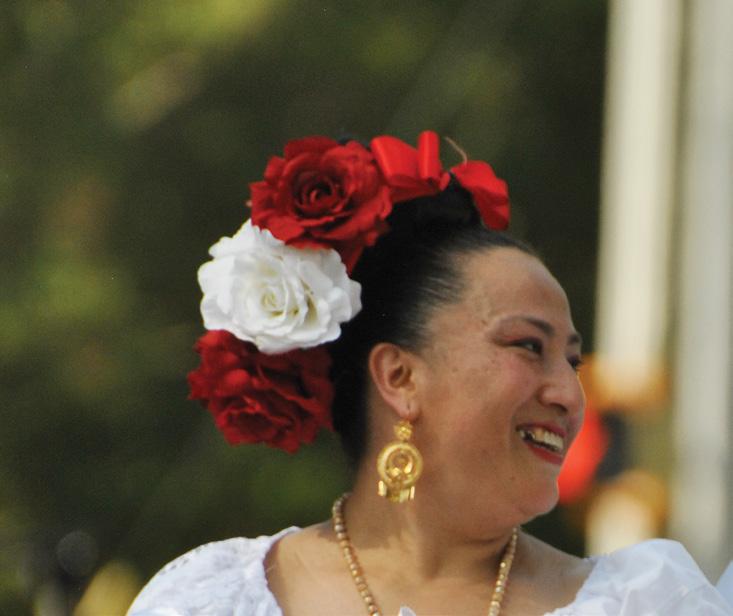
DACC is primarily a volunteer-led organization, with an engaged board of 11, two part time staff, and hundreds of volunteers. This dedicated team puts on the Ritmo Latino Music, Dance, and Art Festival, the 3 Kings Day Parade, as well as lectures, documentary screenings, and art exhibits. The Latino Diamante Awards, their flagship event, honors individuals or organizations that are making significant contributions to the Latino/Hispanic community of North Carolina through a state-wide public nomination process.
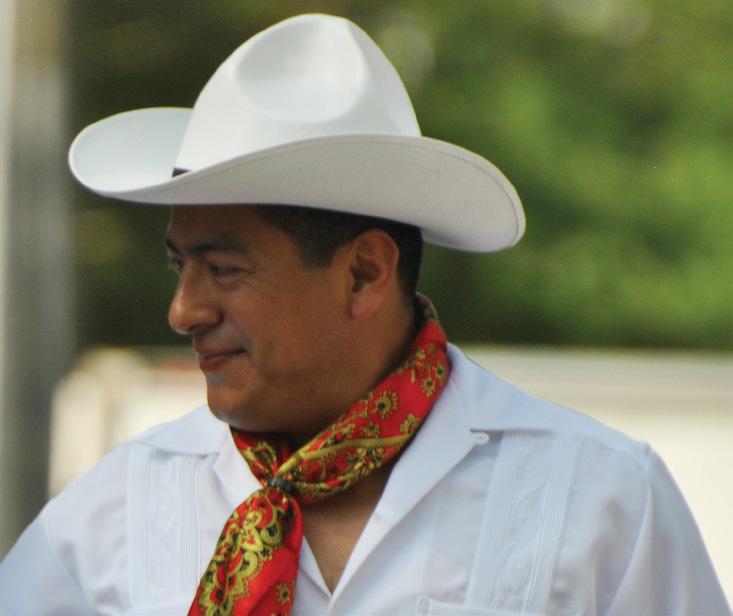
DACC rapidly shifted its work in response to the COVID-19 pandemic. They distributed masks, food to the general public, and cash assistance to Latino artists affected by the pandemic. They commissioned artists to create material to help educate on COVID-19 through song, videos, art, and popular theatre. The pandemic temporarily halted DACC’s ability to convene together, but the DACC is now operating in a new space that is much larger than their previous facility. “Though we’ve been around almost 25 years, it almost feels like we’re starting over,” Lizette shared.
In the heart of the Bull City, Audacity Labs serves as a youth entrepreneurship club for high school students, promoting ideation, social innovation, and design-thinking. Whether exploring entrepreneurship as a career path or hobby, Audacity Labs looks to support students by offering coaching, mentorship, and business structure guidance.
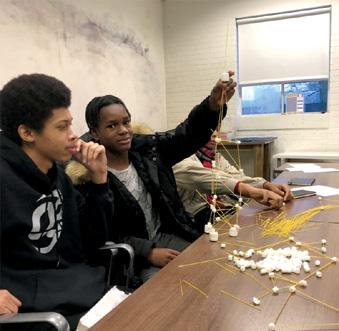
Founded in 2019, Audacity Lab’s mission is to democratize entrepreneurship. While youth often see entrepreneurship in practice, whether through social media or in their communities, they often lack the “know how” and that is where Audacity Labs comes into play. “We want to engage and prepare youth at the high school level and not wait until college,” Executive Director Anjanette Miller says, to minimize the opportunity gap for students from underserved communities. Programs provide youth entrepreneurs the opportunity to create, connect, and grow. They learn key lessons, she says, “failure is opportunity” and entrepreneurship “is a numbers game—sometimes you might have to ask 10 people before you get to a yes.”
Core programs are a semester-long, project-based course, networking opportunities, and college-readiness skills. In 2021 they launched three new programs: a student advisory board to center their leadership, an entrepreneurship and enrichment summer camp in collaboration with Durham Public Schools, and summer field trips to Provident 1898, a coworking, Black-forward entrepreneurship space in Durham. A larger goal, heavily reliant on grant funding, is a stand-alone youth center. “I want to be like a YMCA meets tech-stars,” Miller says.
Latinx immigrant families across the state of North Carolina, LatinxEd is an education nonprofit striving to expand Latinx leadership and educational equity and opportunity statewide. Their work is grounded in 3 L’s: Latinidad (what it means to be Latinx and connecting to those roots), Leadership, and Learning. LatinxEd, founded in 2018, offers programs and resources about college access, community leadership, and cultural identity. “The journey of being a first-generation college student and first-generation immigrant is nuanced but it’s shared statewide by Latinx immigrant folks. So, the fact that we get to be in this position to serve the community that raised us, that nurtured us, that helped us survive the education system itself, is a true honor,” shared Elaine Townsend Utin, co-founder and executive director.
LatinxEd has two core youth programs: Somos Carolina (We Are Carolina), a leadership development and coaching program for high school students started in 2019, and College y Consejos (College and Advice), which provides culturally relevant college advising, started in 2020. These programs are currently focused in Orange and Lee Counties, and LatinxEd plans to expand them to Wake County.
With an emphasis on leadership development, LatinxEd is eager to activate a network of Latinx leaders, helping them gain more visibility as well as amplify their visions of transformative and positive community change. “One of the narratives that we’re up against is that we don’t exist. That there aren’t any Latinx teachers or leaders and that is, simply put, not true. For us, it’s about trying to connect then mobilize,” said Ms. Utin.

Established in 2020, Bull City Performing Arts (BCPA) is the nonprofit arm of the Bull City Music School. Founder and Executive Director Jeanetta Hopkins created BCPA to close the equity gap in access to music lessons and opportunities. The nonprofit allows her to raise scholarships and other funding to engage students from modest means in music education. “Breaking barriers to success” is at the heart of the organization.

The Summer Piano Institute, designed for intermediate- to advancedlevel piano students, includes in-depth piano studies, the history of music, masterclasses, and a final recital. “Access to the Keys,” an afterschool program, offers four levels of training depending on the student’s years of experience, allowing everyone at every level to grow and gain more skill and knowledge. Students in this program are given all necessary materials and instruction, eliminating the financial barrier that often keeps children from exploring an interest in music.
Recently added is the Bull City String Ensemble, in which students receive coaching and side-by-side teaching with the Verona Quartet, the Ensemble-in-Residence with the Chamber Orchestra of the Triangle. Students are exposed to an array of musical diversity, from classical European music, to world music, to more contemporary sounds.
An end goal for the Bull City Music School is for students to see a pathway to excel in musical pursuits. “When our students, our musicians, see that level of music and training that they didn’t think they could have access to, it’s an ‘aha’ moment,” says Hopkins.
Serving the community for 25 years, Augustine Literacy Project of the Triangle (ALP-T) trains volunteers to tutor children to develop strong literacy skills. Focused on children who are not reading at grade-level, ALP-T uses an evidence-based curriculum based on phonics, emphasizing the relationship between a sound and a letter.
Each tutor receives intensive training—pre-course work, classroom, and practicum—based on a proven methodology for teaching struggling readers. One tutor is assigned to one child, and they assist the child throughout the school year, meeting twice a week for 30 to 40 minutes.
In response to COVID-19, ALP-T created a pre-reading curriculum. Executive Director Lori Easterlin said, “this is [for] kids with missed learning who are now in the first grade, who’ve never sat in a classroom until this year due to the pandemic.” ALP-T was able to provide a more in-depth understanding about phonics to the first graders. “We’re introducing consonants and short-vowels to them and eventually, it all started to really make sense to them,” she explained. “And three months later, 8 out of 9 are now moving into our regular curriculum! It’s cause for major celebration.”
In addition to helping children learn to read, ALP-T helps to build self-confidence. In this program, children are likely to go from being shy and reserved, to wanting to read in front of their classmates. Observation and study also showed children were likely to excel in other classes once their confidence increased in reading. “The health of a community is very much related to literacy rates,” Ms. Easterlin says.
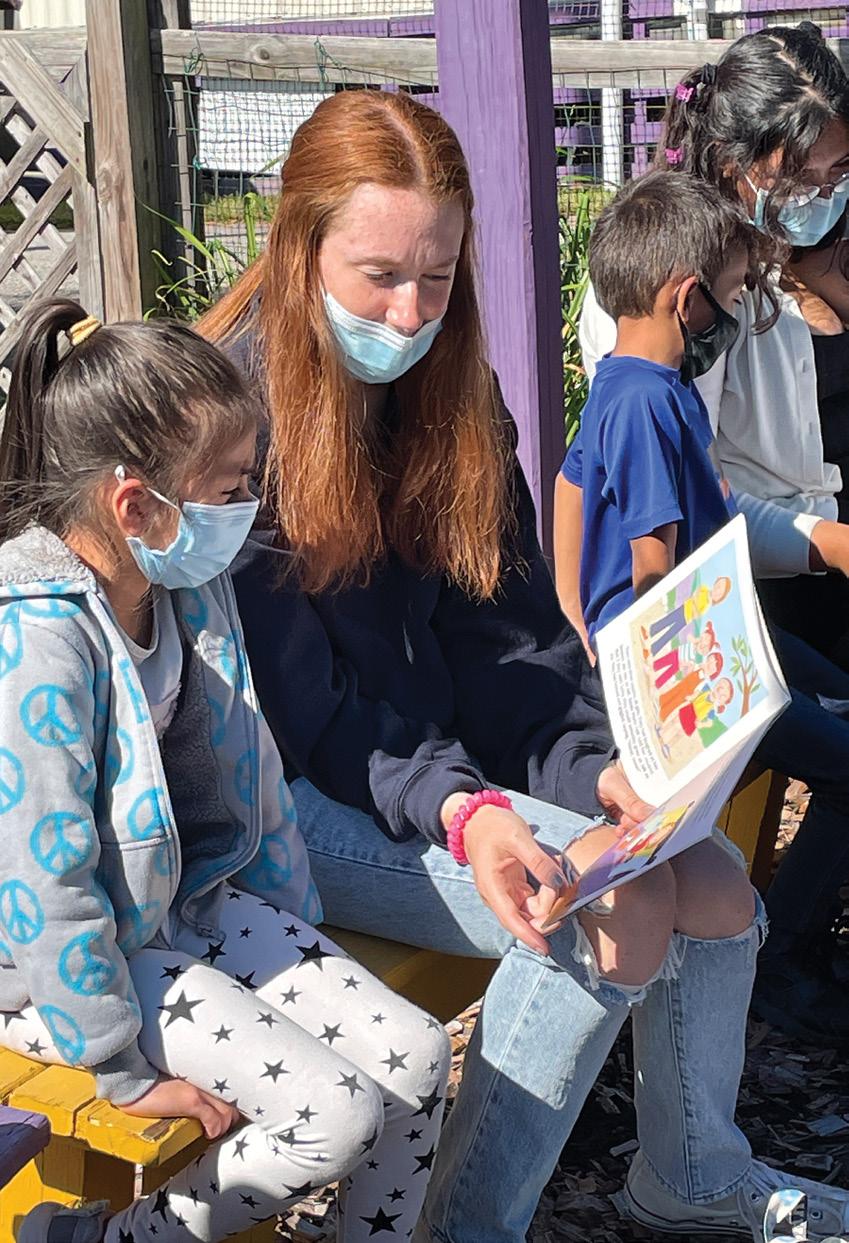
Promoting and fostering interest in historical music performed on replicas of period instruments, the Raleigh Camerata presents music as it would have originally sounded hundreds of years ago. For instance, violins have gut strings rather than synthetic strings and woodwinds are designed differently than modern flutes, horns, and clarinets. A completely different timbre comes from these period instruments, making this music distinctive.
Raleigh Camerata’s concert programs represent the wide variety of music available within the Baroque and Early Classical eras of music. Many people recognize major works by Beethoven, Mozart, and Bach but these composers wrote so much more music. In addition to the lesser-known works of these well-known
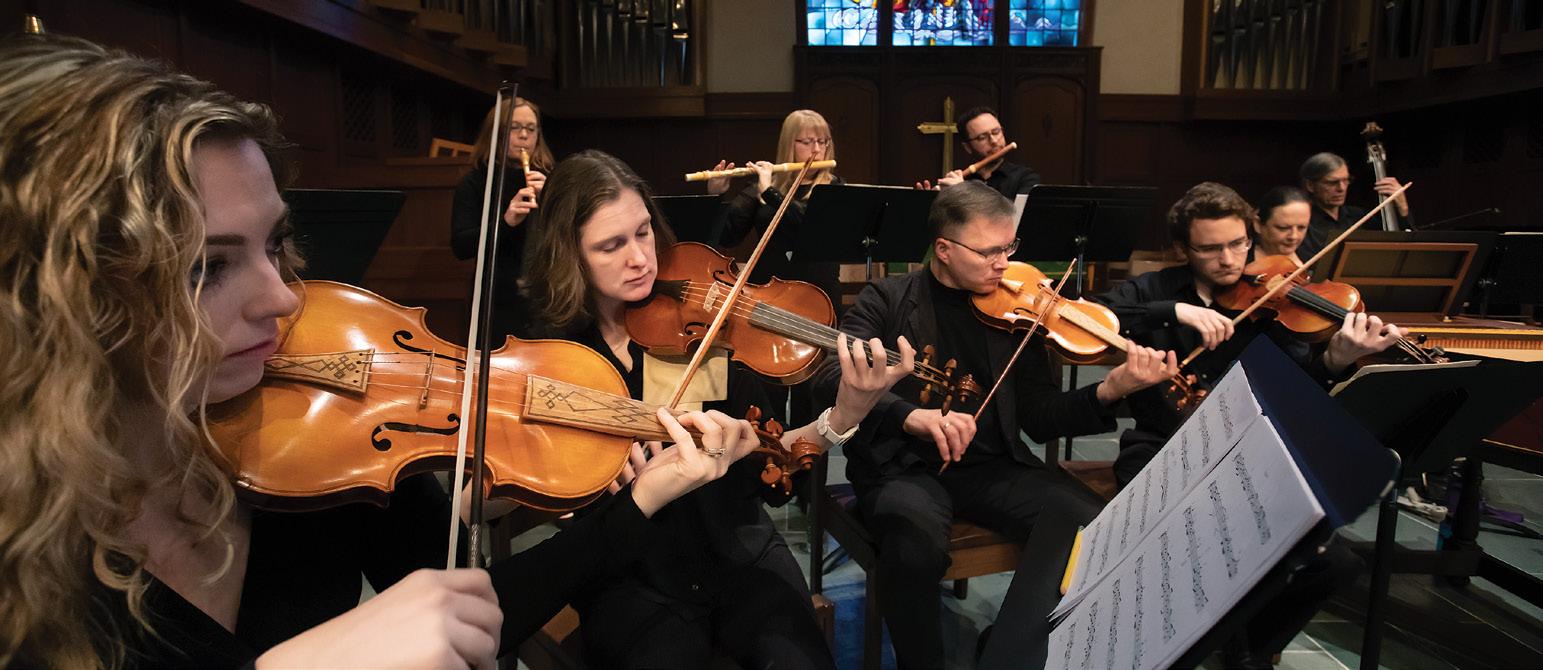
composers, they also strive to introduce audiences to composers they may not recognize, but are as equally talented as those deemed “The Greats.” “We’ll pick pieces that haven’t been recorded in some time, and I create modern editions so that we can perform them. Essentially, we’re breathing life into music that hasn’t readily been heard in a long time. There’s a cool factor in that!” says Dr. Kelly Nivison, who co-founded the organization in 2013. She is also a Baroque flutist.
Raleigh Camerata also wants to expand awareness of this music and develop new audiences. They are planning joint performances with Voices of a New Renaissance, a historical based chorus group, and The Capital City Girls’ Choir, a local children’s choir. Audience enthusiasm and acclaim from music critics inspires Dr. Nivison. “What else can I program? What other music can I bring to Raleigh and Cary?”
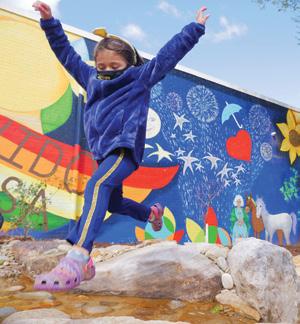 By Karen Kemp
By Karen Kemp
Resilience, creativity, and flexibility helped many Triangle nonprofits weather the pandemic. They were able to adapt quickly and remain nimble. They realized the power of technology to expand their reach and improve accessibility. Meanwhile, MDBF saw it could help its nonprofit partners persevere by making two-year operating support grants in its Arts and K-12 Education programs, rather than single-year project grants. This flexibility from funders helped some nonprofits not only survive, but thrive, adding staff and programming to meet new demands.
Four nonprofits—Durham Symphony Orchestra, Community Music School of Raleigh, National Women’s Theater Festival, and Helps Education Foundation—reflect on what they learned and anticipate how their work will continue to change.
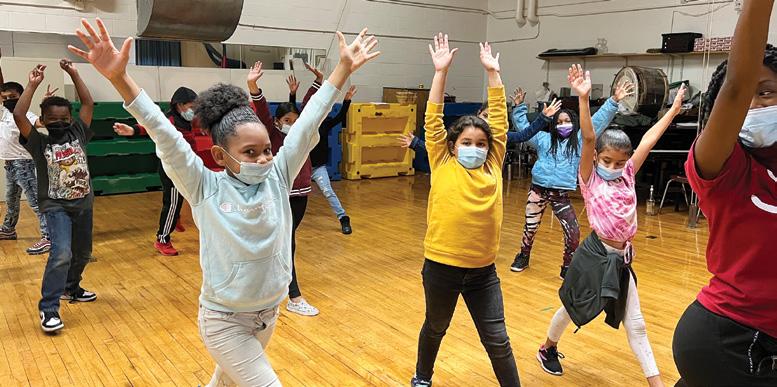
Top: NC Arts in Action, Mary Beth Carpenter
Bottom: El Futuro, Courtesy of El Futuro
Arts
Artspace, Raleigh Click! Photography Festival, Durham Durham Symphony Orchestra, Durham* Gaspard & Dancers, Durham Liberty Arts, Durham Mallarme Chamber Players, Durham MOJOAA Performing Arts Company, Raleigh National Women’s Theatre Festival, Raleigh The ArtsCenter, Carrboro The Beautiful Project, Durham K-12 Education Community Music School, Raleigh Durham Nativity School, Durham El Futuro—Education Support for Latino Students, Durham* Helps Education Fund, Raleigh Kidznotes, Durham North Carolina Arts in Action, Durham* Student U, Durham Voices Together, Durham Village of Wisdom, Durham World Relief Durham—Youth Services, Durham
Total: $400,000
*Grants made possible through an estate gift to MDBF from the JLSK Trust
The wave of social justice activism following the murder of George Floyd prompted many nonprofits to put new emphasis on equity, diversity, and inclusion. For the Durham Symphony Orchestra (DSO), these have been core values for years. Maestro William Curry, composer, conductor, and music director since 2009, is the only African American music director of a symphony in the history of the South. He has experienced discrimination throughout his career.
Curry is concerned some are approaching this challenge with a “box-checking” mindset rather than making the deep, fundamental changes that are needed. After working to diversify classical music throughout his career, Curry says nonprofits need to commit to sustained, long-term effort. There is “no quick fix for a problem that started four centuries ago.”
Diverse performers, audience members, and musical selections are all important for the long-term health of symphony orchestras, Curry says. They must attract new, younger, more diverse audiences and reject the “terrible snobbery and conformity” that have characterized classical music. Known as “The People’s Orchestra” of Durham, DSO’s core strategies to expand audiences and remain relevant are to feature works by American composers in every program; frequently present world premieres by new composers; and prioritize school outreach. “Every opportunity I have to talk to a young person, I do it,” Curry says.
With live performance off limits during Covid, DSO turned its energies to
publishing a treasure trove of recordings of DSO concerts, says board member Suzanne Bolt. Curry wrote an introduction for each concert and they launched “Monday Musicale with the Maestro.” DSO published and shared more than 60 Musicales through their website, listserv, and social media between April 2020 and May 2021 to keep audiences engaged until live performances could resume. The pandemic showed DSO the value of sharing their music online. They also saw that doing more to promote their work can expand their audience. “We need to get more visual,” Curry adds.
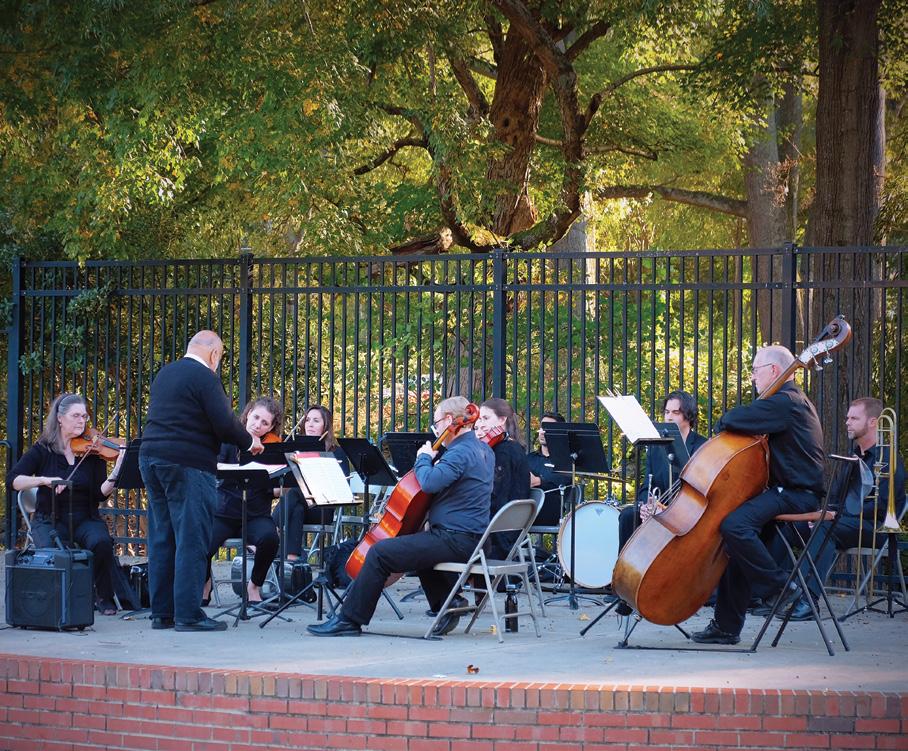
CommunityMusic School of Raleigh offers high-quality music education for as little as $1 per lesson to underserved young people in Wake County. Enrollment hit a record this spring200 students. Previously the annual average was 100 and after enrollment dipped during Covid, it’s “thrilling” to pass this milestone, Executive Director Melanie Doerner says.
Like so many others, CMS had to pivot to exclusively virtual programming for 18 months. The change was difficult, remarks Doerner, because in-person, one-on-one lessons are “core to what we do.”
When teachers are face-to-face with their students, they can more easily develop mentoring relationships. They can correct how a student holds an instrument or places their fingers on keys or strings. In addition, the lack of access to a reliable internet connection after school makes virtual learning a challenge for some CMS students. For all these reasons, CMS returned to face-to-face lessons as soon as possible, in the fall of 2021. Nevertheless, remote learning is here to stay, Doerner says. In fact, this spring about 20% of students are still choosing that option for at least some of their lessons.
“The number one reason is transportation,” Doerner says. One family with four children enrolled cannot manage travel to separate in-person classes four times a week. To serve families with this need, CMS offers hybrid, in person/remote learning. Tracking hybrid students’ progress compared to in-person students is a new challenge for CMS.
Data informs CMS’s operations more than ever before, Doerner notes. A review of students’ zip codes showed most of their students live in Southeast Raleigh, which has been true historically. However, now, Garner and Knightdale are among the top five. Doerner expects this geographic shift to continue as the cost of living rises in Raleigh and families relocate to find lower housing expenses. Student transportation challenges will likely grow in importance for CMS in the future.
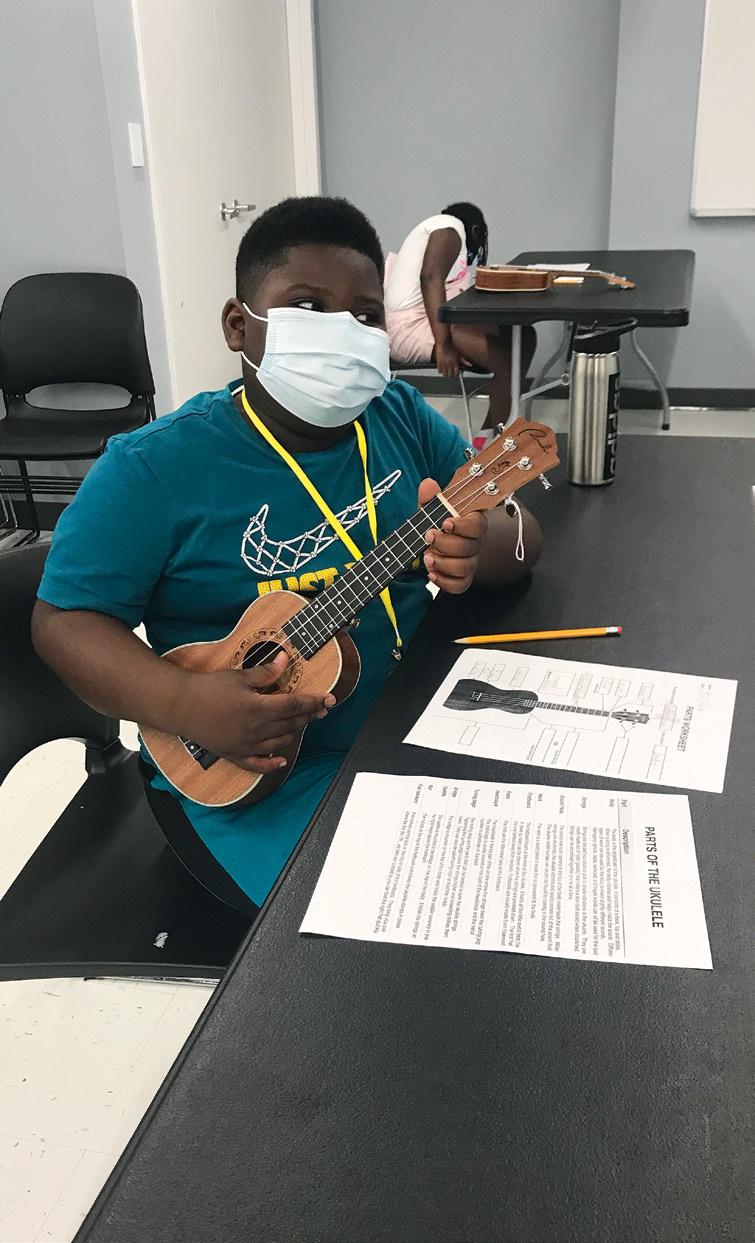
Post pandemic, the National Women’s Theater Festival (NWTF) is stronger, growing in reach and influence, and totally committed to virtual programming.
“We are coming out of this phase more confident that we are primarily a festival, not a theater company that produces a season of plays,” says Executive Artistic Director Johannah Maynard Edwards.
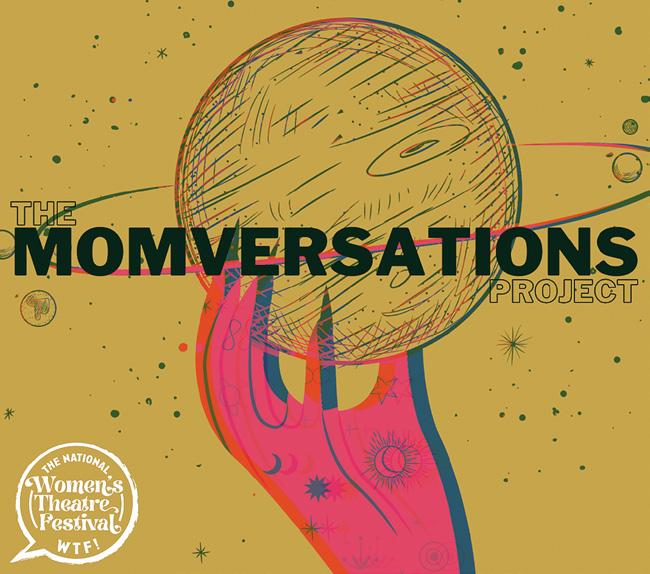
When the pandemic hit, NWTF was already in a rebuilding phase after the departure of the founder in late 2019. Covid put the process into overdrive. A board member living in Beijing gave Edwards early warning of what was coming. Edwards immediately began worrying how they could stage their signature event, a
summer festival. Edwards had just attended the Southeastern Theater Conference and had purchased scripts to read. “I thought, why don’t we do a play-reading club online, just relax together, and talk about it?”
NWTF has no venue, which means there’s no lease or overhead. “We weren’t the Titanic trying to steer away from the iceberg, we were this little sailboat,” says Edwards.
One week after everything shut down, NWTF had already conducted its first experiment with virtual programming. Mikki Marvel, a colleague who is active in the gaming community, helped launch the play-reading club on Twitch. A contact who works in theater marketing invited Clare Barron, Pulitzer-nominated author of “Dance Nation” to join the discussion of her play. For its next event, NWTF landed rising star Kaja Dunn to perform a virtual reading of “Natural Shocks” by playwright Lauren Gunderson. NWTF’s early successes were noticed in the theater community and soon they were helping other companies stage virtual performances.
Technology was easier than ensuring equity, Edwards says. The company, historically led by white women, has a mission of “leveling the playing field” in theater for women, people of color, and anyone who has been marginalized. This means taking extra care to ensure standards of fairness and inclusion are sustained in virtual spaces. “Being the kind of white woman leader in theater that Black women trust is a lot harder than setting up a webcam,” she says.
NWTF’s annual budget tripled from 2019 to 2020 and has kept growing. Since 2020, they have produced two virtual festivals, two virtual staged readings, two mainstage productions, and numerous education programs. They’ve experimented with “pay what you can” ticket pricing as part of their commitment to economic accessibility. Unrestricted funding from MDBF and other partners is a big reason for their success, Edwards says. It allows her to stay in the field she loves.
Edwards is optimistic about the future and certain technology will continue in a leading role. This year, NWTF’s festival will be both “venue-based” and virtual. “We need to do both. I think this is the future of theater in the VR world.”
While North Carolina’s K-12 schools were riding the waves of the pandemic, Helps Education Fund (HEF) was right there with them. HEF offers programs to advance learning outcomes in literacy and math. To promote educational equity, HEF partners with educators, schools, and community organizations that primarily serve students and families who are historically underserved. HEF is emerging from the challenges of the last two years with a bigger staff and more programs. More than 20 staff members joined HEF to cope with a tripling of demand.
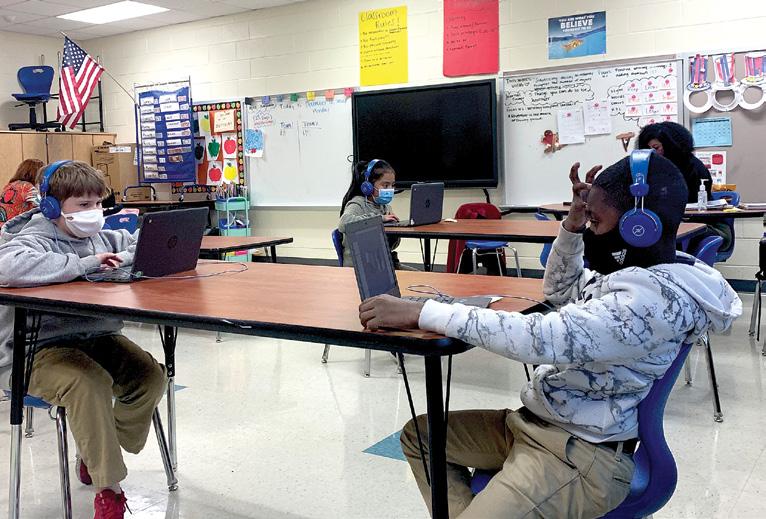
“We provide evidence-based educational programs and services for learners from birth through adulthood, which makes us versatile,” says Haruna Suzuki, Director of Adult, Family, and Community Empowerment programs.
HEF’s strong community ties, ability to be nimble, and diverse funding base helped the organization strategically grow and sustain its operations. In addition to receiving a range of state and federal funding, contracts with school districts, and individual donations, they also partner with other nonprofits and foundations, including the MDBF.
“The Mary Duke Biddle Foundation has been a significant partner for us during this time,” says Jennifer Copeland, Advancement Manager. “General operating support is simply invaluable. Once the pandemic began, MDBF funding provided crucial flexibility as we translated our programs to a virtual context. This past year, we continued to have unexpected challenges in returning to in-person schooling and recovery from the pandemic. General operating support is more important now than ever before, and we deeply appreciate it.”
Before the pandemic, HEF offered nearly all its programs in person, usually in schools and community centers, and often with the help of volunteers. In spring 2022, Covid-19’s impact was still evident: nearly all programs and services were still virtual. While in-person learning has advantages, HEF was able to pivot while maintaining effectiveness. “Our programs have translated well into a virtual
mode of delivery. The fact that meaningful student growth has continued given the virtual context is something we are very pleased with,” Suzuki says.
Although virtual programs provide some benefits for participants— such as removing travel time and childcare needs—HEF is concerned about the inequities that existed before the pandemic and have grown with the virtual delivery of educational programming. In addition, HEF has grappled with the timeintensive and unpredictable nature of serving schools, families, and communities during a pandemic.
“The work involved in management and coordination of programs has doubled,” Suzuki says. While they fully expect to return to providing in-person programming over time, it will only happen after careful consideration with community partners, Copeland and Suzuki agree.
“We will continue to navigate site by site based on how the pandemic goes,” Copeland says. “It has been an unusual time and we will continue to support students and families as we all recover from the COVID-19 pandemic.”
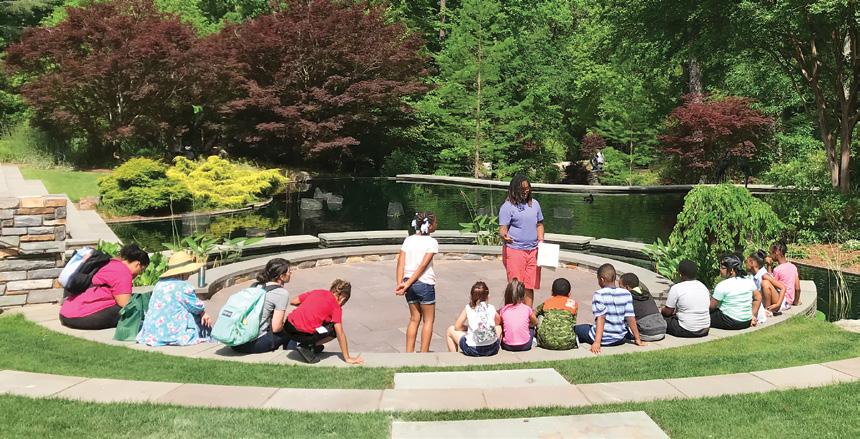
Off the Map: The Provenance of a Painting at the Nasher Museum of Art is a study in provenance research of a single work of art. The exhibit examines the painting Portrait of an Artist, now attributed to Joseph Wright of Derby (1734–1797) and bequeathed to the Nasher in 2013 by Mary D.B.T. Semans, in memory of her mother Mary Duke Biddle. Associate Curator Molly Boarati organized the exhibit, which examines the eighteenthcentury painting’s journey from its creation 250 years ago to its current place in the Nasher’s collection. The installation displays the painting’s archival documents and the fascinating path it has traveled, including its recent conservation and change in attribution from Joseph Siffred Duplessis to Joseph Wright of Derby.
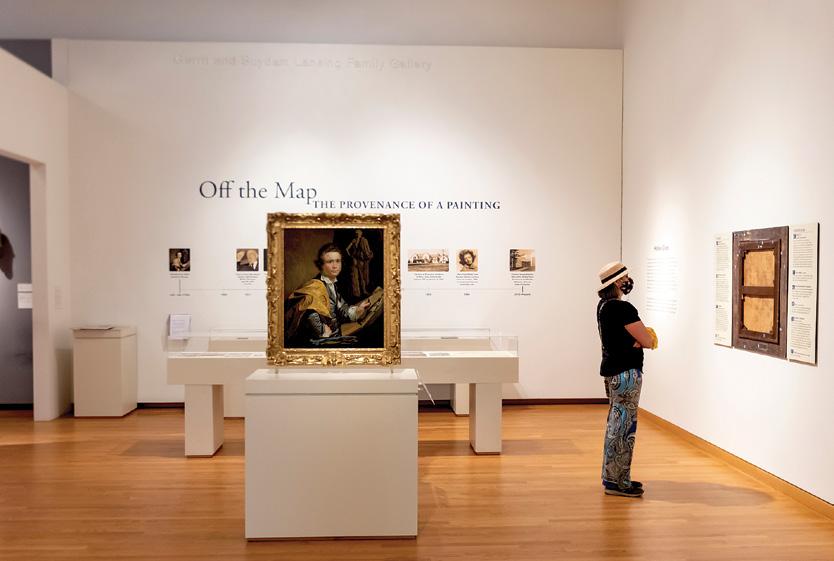
American Dance Festival, Durham • $10,000 Chamber Orchestra of the Triangle, Chapel Hill • $10,000
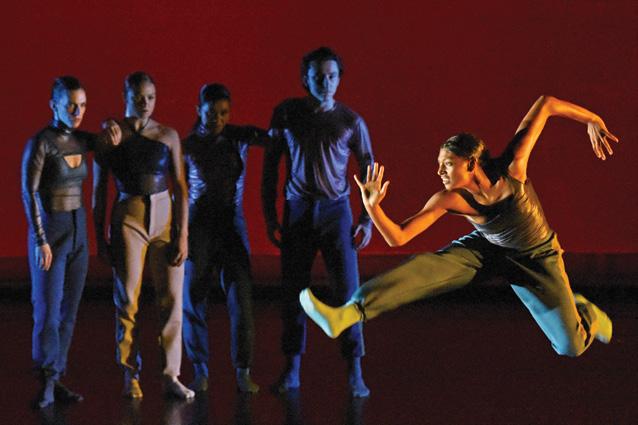
Durham Arts Council, Durham • $20,000
UNC School of the Arts, Winston-Salem • $60,000
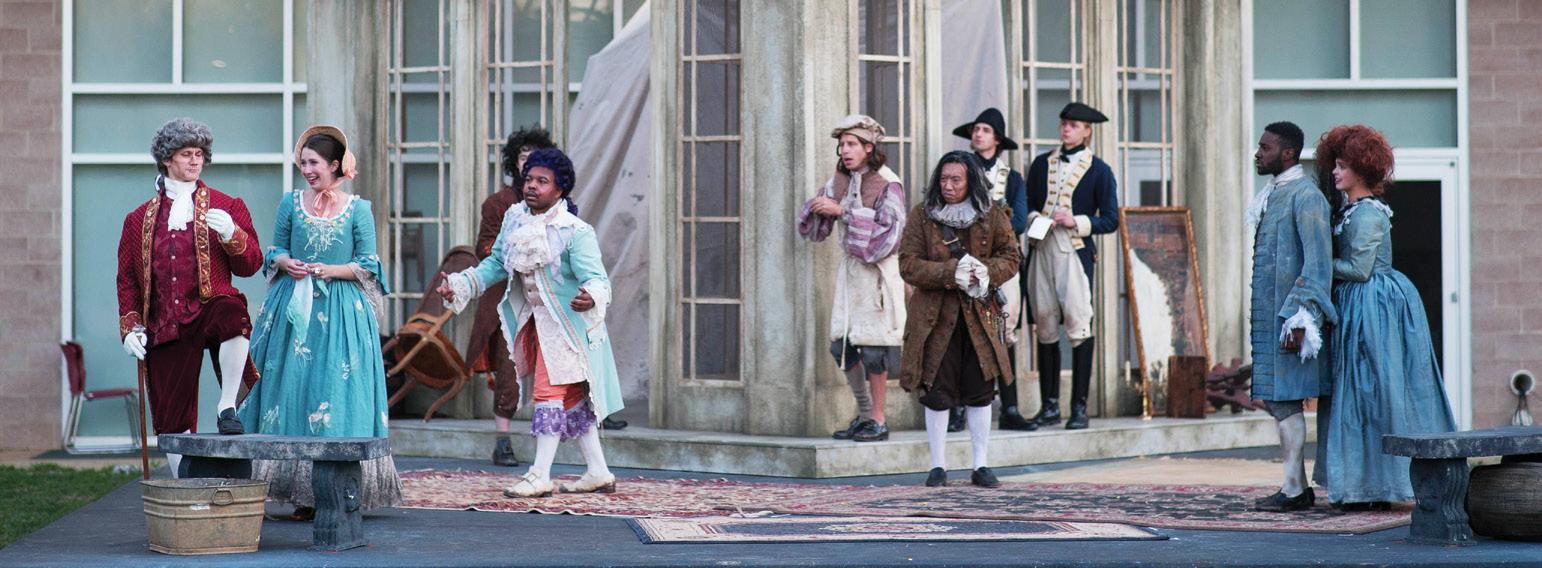
Durham Art Guild, Durham • $3,000
Six Feet Photography Project, Durham • $5,000 The Art of the State/UNC Press, Chapel Hill • $5,000
Juneteenth Jubilee, Durham • $5,000
Audio Under the Stars, Durham • $3,000
Community Remembrance Coalition-Chatham, Pittsboro • $1,500
Augustine Literacy Project of the Triangle, Durham • $5,000 (Honoring Todd Walker, MDBF trustee)
Christ Church United Methodist Church, New York, NY • $5,000
Duke Memorial United Methodist Church, Durham • $5,000
Irvington Presbyterian Church, Irvington, NY • $5,000
North Carolina Center for Nonprofits, Raleigh • $5,000
Total: $147,500
The Southern Documentary Fund (SDF) was founded in 2002 with a mission to support documentary artists in the American South, filling a substantial gap in services. Over the past two decades, SDF has become an integral partner with veteran and emerging makers, helping artists direct their lenses at powerful Southern stories. MDBF, a consistent funder, converted a 2020 project grant to operating support in response to the COVID-19 pandemic.

Kristy Garcia Breneman, previously SDF’s Artist Development Director, was appointed Executive Director in June 2021, amid the disruption caused by the pandemic. She said, “a number of challenges over the past two years have guided SDF in making necessary changes in order to continue serving the Southern documentary community. Shifting from in-person events to virtual offerings has proven to be a positive and lasting change for SDF. It’s allowed us to reach more makers across the South and create highly accessible programming.”
Ms. Breneman remarked, “our reimagined programming continues to evolve in direct response to the current needs of the Southern documentary community and ensure they reach their intended audiences.” SDF and the filmmakers continue to shine a light on many social topics which enlighten and inspire through these films’ craftsmanship and artistry and “many are simply good stories, or good art.”
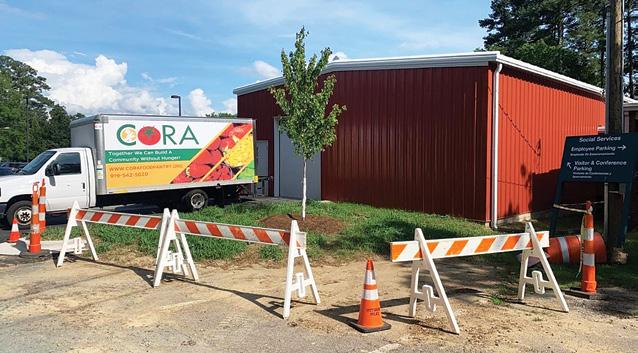
The Chatham Outreach Alliance (CORA) is a nonprofit dedicated to eliminating food insecurity in Chatham County. In 2021, CORA fulfilled more than 60,000 requests for food assistance and served over 76 new families per month. Melissa Beard, CORA Executive Director, says “CORA continues to see the lingering effects of the pandemic. There has been another steady rise in demand since the unemployment supplement was discontinued. Also, now that grocery prices are increasing and shoppers are realizing shortages once again, we know our service number will see a significant increase.”
CORA operates several programs: The Pantry, a food bank that switched to prepackaged boxes for pickup during the worst of the pandemic; Summer Nutritional Assistance for Chatham Kids (SNACK) from June to mid-August; and Mobile Markets in strategic points around the county where the need is greatest. The staff, volunteers, farmers and vendors are working hard in Chatham County “to build a community without hunger.” MDBF made two grants, December 2020 and December 2021, to help with CORA’s relief efforts as part of its COVID-19 grant making.
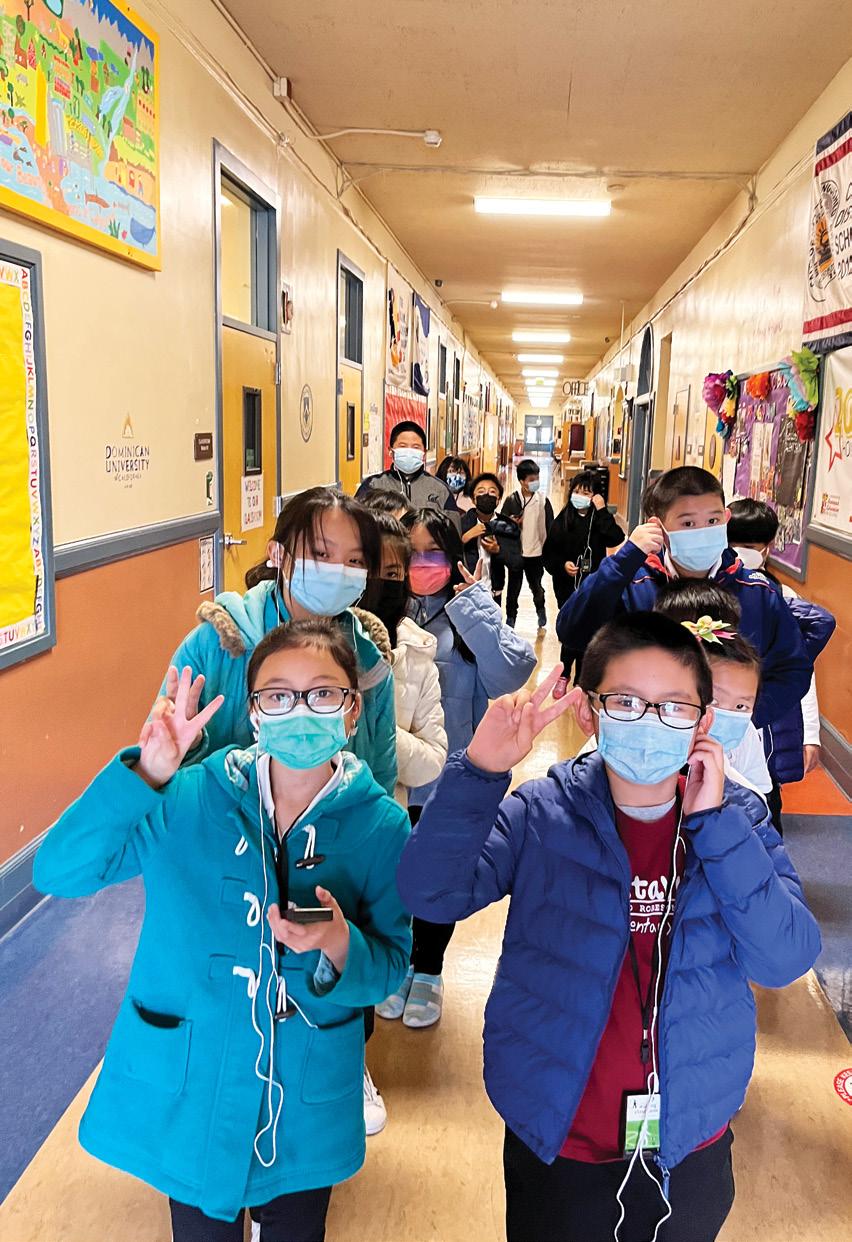
How to engage and motivate students? The Walking Classroom is an award-winning nonprofit founded in 2011 by a Chapel Hill teacher to address this question. Students, grades 3rd through 8th, take brisk walks while listening to specifically-developed podcasts preloaded onto audio devices called WalkKits. This gives students time away from the computer screen and offers fresh air and exercise while learning. After each walk, the teacher discusses the podcast using the companion Teacher’s Guide. It’s a great way to break up the school day or use as an after-school learning tool.
MDBF’s March 2020 grant originally was made to provide STEM WalkKits to teachers in Orange and Chatham Counties. Then the COVID-19 pandemic shut public schools down. Debra Ives, Executive Director, said they used the grant “to pivot and provide an impactful service to almost 270 educators. Teachers participated in targeted training and, upon completion, received a new set of earbuds or batteries to be used with their students’ WalkKit audio devices.”
She continued, “We have found a real appetite for our program in schools right now. After months of learning from home, there is great concern about learning loss. WalkKits are an ideal way to engage students in stimulating, standards-aligned content. In addition, The Walking Classroom is an avenue for social-emotional learning with the opportunity to discuss the character values embedded in each podcast.”
“Artspace’s mission is to inspire positive community impact through art. By providing a voice, sharing a different perspective, bringing intrigue to the everyday, and sparking critical dialogue, art transforms perceptions and breaks down barriers.”
These words began Artspace’s grant application in September 2020 for the Community Impact Residency in collaboration with the Black on Black Project, founded and directed by Michael S. Williams.
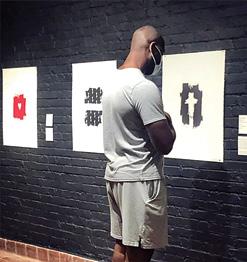
A grant from MDBF allowed artist Michael Kiser to learn how to curate every aspect of an exhibit working with curator Alexys Taylor. His exhibit was “MMXIX: I’m Glad You Believed in Me.” This exhibit included Kiser’s original art and a short film all chronicling his grieving process after his father’s death. Annah Lee, Artspace Creative Director, noted the exhibit “was presented under the theme of Black Mental Health and through Michael William’s community connections, Artspace created programming with National Alliance on Mental Illness Wake County to discuss issues of mental health as they relate to the Black community. In addition to these programs, we created a space in the gallery to provide resources and space for reflections to visitors. This was an extremely impactful and meaningful project.”

In June 2020, MDBF made a grant to Arts & Health at Duke for a mural commemorating the more than 24,000 Duke University Hospital employees who bravely served their community during the worst of the COVID-19 pandemic. Sharon Swanson, then manager of Arts & Health at Duke commented, “This is an entire community of people who stepped up, came to work every single day no matter how hard it was. And we wanted to recognize and celebrate all of those people.”
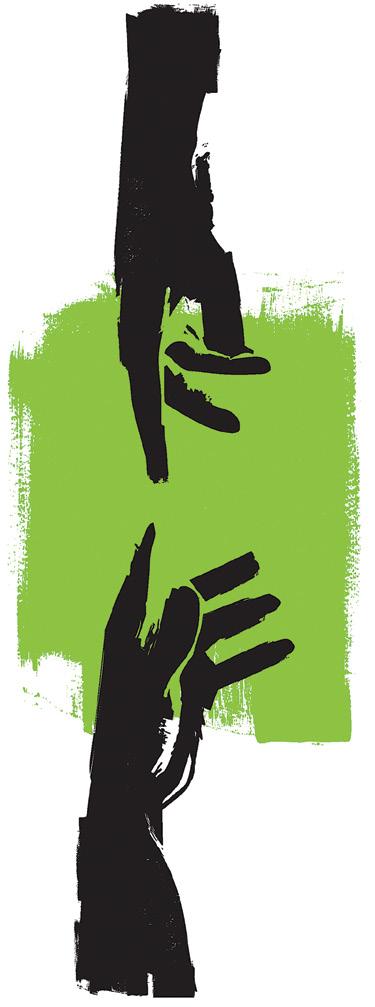
Sean Kernick, a Raleigh artist, was selected to portray all members of the Duke Hospital team—food services, transport, doctors, nurses, technicians and more—who risked their own safety to care for patients. He made his backyard his studio and spray-painted an eight-panel mural featuring actual hospital employees.
The mural is displayed in the concourse that leads from the main hospital to the Duke Cancer Center and Duke Medicine Pavilion. Now a permanent part of the Duke University Hospital Art Collection, it has touched the hearts of the hospital staffers and become a point of pride for all those on the front lines during the pandemic.
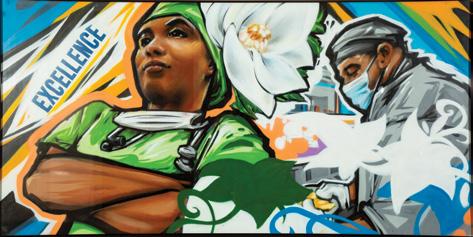
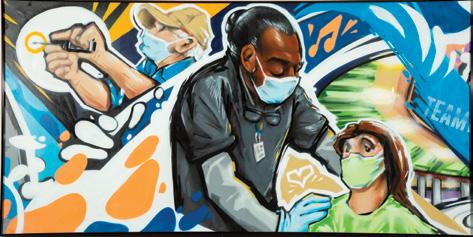
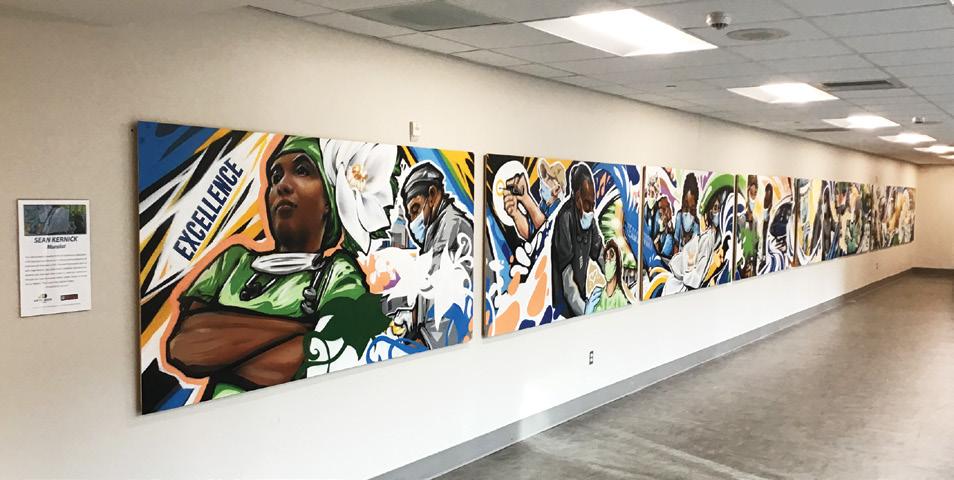
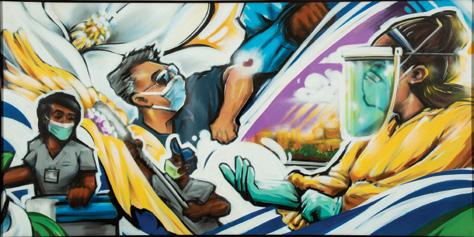
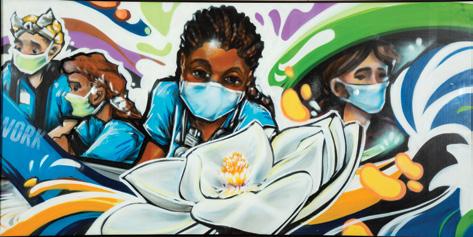



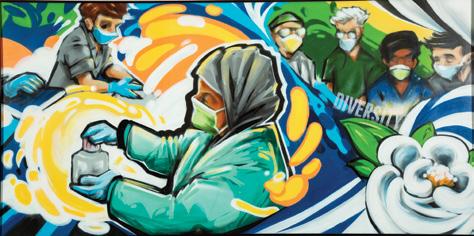
“This is an entire community of people who stepped up, came to work every single day no matter how hard it was.”
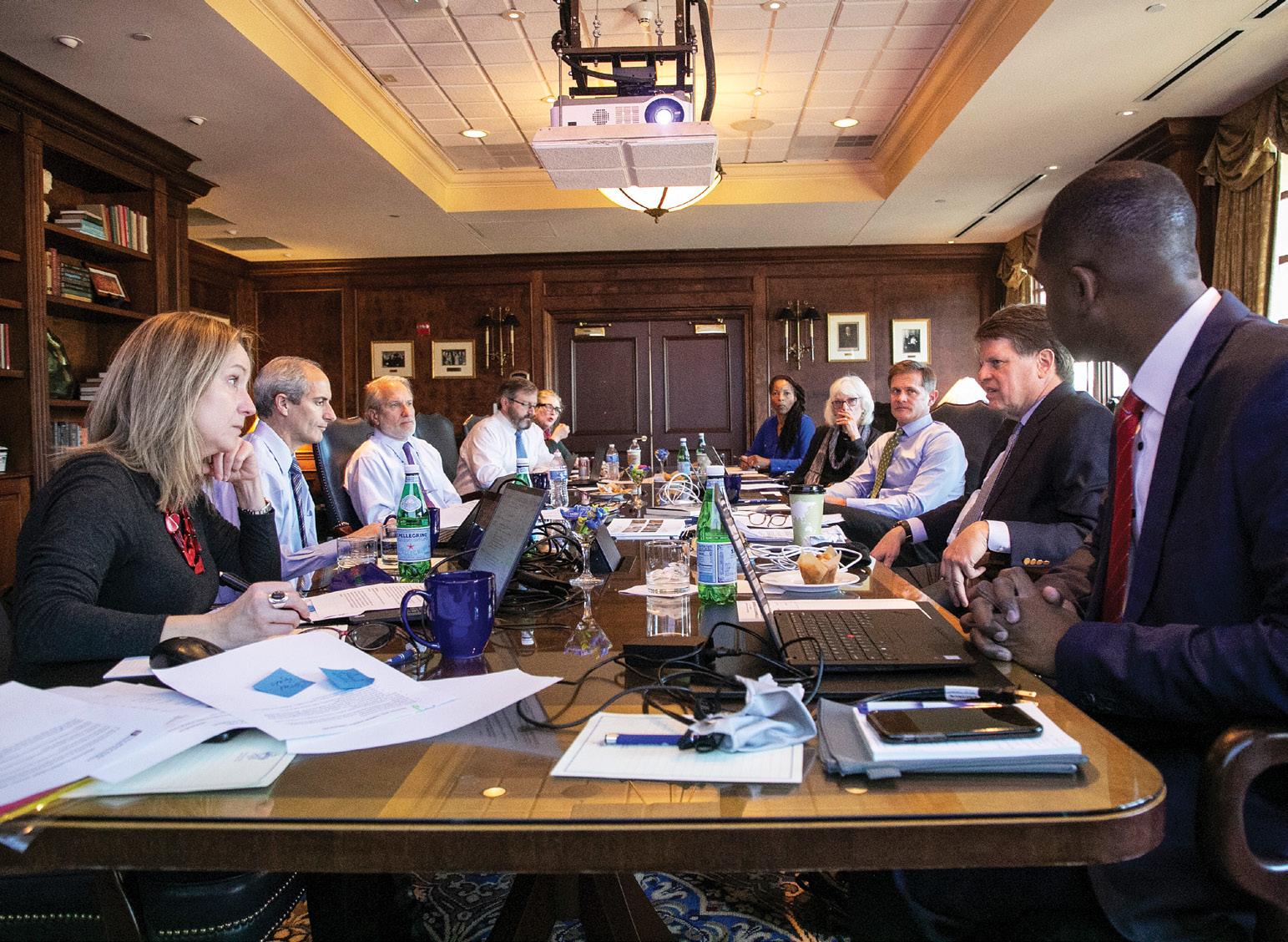
What He’s About “I spend my free time with my family. I am most proud of raising my kids and supporting my wife, Pam, who is a neonatologist.” They have three children: Walt, 20, a freshman at Colorado College; Charlie, 17, a high school junior; and Vivi, 11, who is in 5th grade.
that kind of behavior, especially in Europe, and gave them a piece of her mind. At the time, I was mortified. Now I realize how gutsy she was.”
Fun Ben and his wife hit the slopes nearly every weekend. They like to skin up and ski down. (Skinning means hiking to the mountaintop in skis.) When asked, “Don’t you want to ride the lift?” Ben says, “No, this is the fun part! And it’s great exercise.”
Professional Pursuits As Chief Development Officer for Radiance Holdings, Ben, a lawyer by training, oversees all growth initiatives including sales, real estate, and corporate acquisitions. Radiance Holdings owns two franchise brands, Sola Salon Studios (610 open locations) and The Woodhouse Day Spa (74 open spas). Ben has been with the company for over 10 years, has worn every hat in the company and has been responsible for much of its growth.
An Influential Person His grandmother, Mary D.B.T. Semans. “Twice she took me to Europe for the summer, when I was 10 and again when I was 13.” His grandparents traveled with the University of North Carolina School of the Arts orchestra and helped fundraise for the school around their performances across the continent, giving Ben early exposure to philanthropy. He not only had cultural experiences he will always remember, he also saw his grandmother’s character. “I remember an incident in France when a group of American teenagers was being antiSemitic. She confronted them, telling them about the history of

Career Allison began her Duke career in undergraduate admissions and over the next 36 years she advanced through a series of leadership roles, reaching University Secretary and Vice President. Her office was responsible for coordinating the work of the board of trustees and choreographing major ceremonies including commencement and presidential inaugurations. She previously served on the boards of the Hill Learning Center, Durham Academy, UNC School of the Arts and UNC-Asheville.
Role Model Allison grew up in the small North Carolina town of Denton. Her dad lived by the Golden Rule, which influenced how she has tried to live. He told her, “Education is the only thing I can give you that no one can ever take away.” Allison was the first in her high school to apply to Duke, a decision that set her life course.
Proud While she is proud of her Duke career, she is “most proud of my family.”
First Meeting Allison remembers vividly the first time she met Mary D.B.T Semans. She was sitting with admissions colleagues around a large conference table, surrounded by piles of applications, when in popped a petite, very bubbly woman who asked how it was going. She stayed briefly. “Who was that?” Allison asked. Feeling like she had met royalty, Allison was surprised when Mrs. Semans returned a little later with a platter of cookies. “Kindness and generosity, that was the epitome of everything I ever saw of her.”

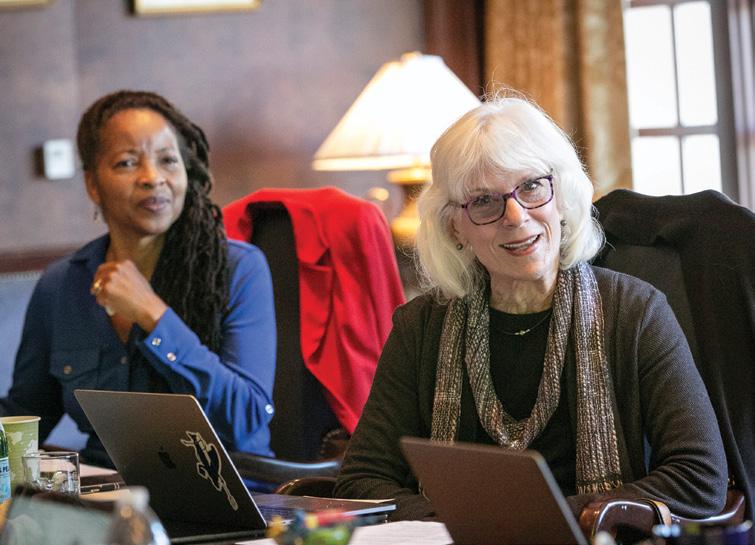
Family Ties As a greatgrandson of Mary Duke Biddle, it was always likely Joe would attend Duke University. But in his first year, ”I wasn’t loving it,” he says. He took a short break and when he returned, he lived with his grandparents, Mary and Jim Semans, and saw the impact his grandparents had in the community. “I still run into people who were touched by her compassion and generosity. Her giving spirit, energy, and leadership definitely influenced me, the way I give back, and my service on our family boards.”
Two Shades of Blue Joe ended up transferring to UNC where he earned his bachelor’s degree and became a Tar Heel basketball fan. He returned to Duke to earn his law degree. “It’s a good place to be when you like both teams. You almost always have a team in the final four!”
He and his wife transformed their two acres in Charlotte into a farm complete with chickens, a barn, numerous tomato varieties, multiple herbs and medicinal plants, and fruit trees galore—persimmons, figs, olives, pomegranates. His wife is the driving force. “I dig holes and move heavy loads; I’m the farmer’s hand.” When they aren’t in the garden, they are biking or walking on the McAlpine Greenway.
Please Don’t… Call him “Joseph.” His full first name is Josiah.
Baseball As head of Myers Park Trinity Little League for 10 years, Joe led a revitalization of the league in which his sons and daughter played. His children are grown now, and Joe is no longer involved with the league, but he is proud to see it still growing and thriving.
Giving Back Lois’ career has centered on amplifying potential. During two decades in fundraising at Duke, she focused mainly on projects to enhance neighborhoods around the university. As Vice Chancellor at North Carolina Central University, she directed the NCCU Foundation, fundraising and alumni relations and she still supports NCCU as a volunteer. Now, after stepping down from her Executive Vice President role, she is a senior fellow at Self-Help.
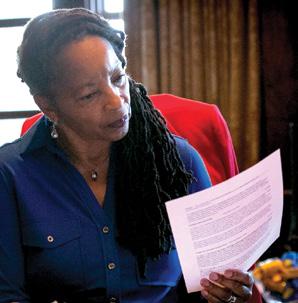
Dual Career Throughout her working life, Lois has also been a professional jazz and blues musician. While songwriting is her primary interest, “I’m humbled that people seem to enjoy my singing.” She fronts jazz bands that perform regularly and has five records to her credit.
First Jobs Lois grew up the 7th of 10 children in rural Northampton County, North Carolina, and, among other chores, helped harvest cucumbers on the family’s land. Her first paid summer job was at her elementary school, “cleaning classrooms, toilets and blinds” at age 12. It was hard work but better than the alternative: working in cotton and peanut fields in the summer heat.
Words to Live By “Do all you can, with what you have, where you are.” To Lois, this means recognizing your gifts and assets—not focusing on what you may lack.
Pleasures Lois used to proudly say, “I don’t watch TV,” but that changed during the pandemic. “I love documentary films— learning new things and getting a glimpse of other lives and cultures.” She enjoys gardening at her home in Durham. Recently she was thrilled she got several orchids to rebloom!
MDBF Russell was invited to the board by Mary D.B.T. Semans and is the longest-serving trustee. “I love the foundation’s philanthropic purpose and the family connections, even though I am not a family member.” He values equally the foundation’s support for education and the arts. With regard to Duke, Russell particularly enjoys supporting university efforts that bridge town and gown. “I’m very passionate about that.” Among the many programs the MDBF has supported over the years, Russell is proud of the foundation’s early support for Duke Health’s Arts & Health program and its support for Durham Public Schools and organizations such as Durham Nativity School.
Good Advice When Russell started work in investment banking, his dad advised him to stay aware of various “life boxes” and to keep them balanced, “not just grinding away at mergers and acquisitions, but balancing work with giving to others.”

Giving Back “I enjoy giving back to the community in different ways, here [in Charlotte] and in Durham. I come from a family of helpers”—physicians and Presbyterian ministers—and I approach what I do as an investment banker as ‘helping’ too—helping entrepreneurial companies grow and succeed. I enjoy helping people make good decisions.”
To Relax Russell enjoys doing anything outdoors, even golf, although his golf game “always needs a lot of improvement.” Russell used to ride horses and intends to get a horse again someday. He’s the trip planner in his family, a role he relishes.
Proud “I am proud of my family and raising two wonderful daughters with a wonderful wife.” One daughter is enrolled at Furman and the other at Elon.
Motto “If you truly believe in yourself, run your own race.”
Yomi’s parents instilled this mindset in him. Immigrants from Nigeria, they forged new lives in America. His father was an engineer at NASA and his mother started her own business. They taught him: “Look down your own path, surround yourself with good people and run your own race as hard as you can. I tell my kids this, too. Have confidence in yourself.”
Career After completing his PhD, Yomi sought to combine his science expertise with the business side of medicine. Although he lacked a finance background, Goldman Sachs said, “We’ll teach you the business side.” He and his wife loved New York, but moving back to North Carolina gave them greater work-life balance. As an investment manager at DUMAC (formerly Duke University Management Company), Yomi is part of the team managing Duke’s endowment and other entities. “It’s rewarding to walk on campus and see buildings being built, hear professors being hired, and students being rewarded scholarships and know you’ve been a part of it.”
Sports Yomi and his wife were both varsity athletes at Cornell University. His three daughters and son, ages 5 to 14, are all athletes and weekends are packed with sporting events. The whole family enjoyed attending the 2019 Women’s World Cup in France where they cheered on the US Women’s National Team to victory.
First Generation Although Yomi was born and raised in Houston, his Nigerian culture, food, and music are important parts of his life.
Family Ties George is a grandson of Mary Duke Biddle and the newest trustee. His daughter is enrolled at Duke and George is “excited to be more engaged with the Duke side of my heritage.”
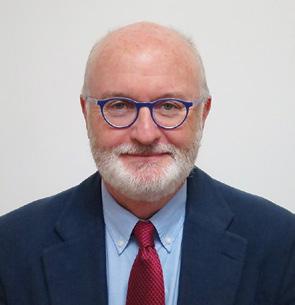

Global Nonprofits George brings a new perspective to the board: With more than 30 years of international nonprofit work experience, he has been on the grant-seeking side of the table, too. He began his career peacebuilding in Central America. Later, he traveled continually during 16 years in top leadership roles with International Rescue Committee (IRC). George now chairs World Connect, a nonprofit that helps leaders in the Global South to pursue grassroots solutions to poverty and inequality.
A New Skill “I learned to ski at age 45 and I love it.” Learning to ski was part choice, part imperative. His wife Leslie began skiing in childhood and urged him to join her on the slopes.
On the Arts Although George has “no art ability” and pursued international studies in college and grad school, his favorite courses were art courses. “The arts play a central role for humankind… joy, pleasure, uplifting spirits, and relieving stress and anxiety.”
Influential Person Meeting Salvadoran human rights activist Leonel Gomez shifted George’s view of the role of global actors within a troubled country. “He had a huge impact on me. He was the first person who told me, ‘You are part of this process.’ ”
Too Funny “I can be in an exceedingly serious situation and see something light or humorous in it. I sometimes need to turn down my humor quotient.”
SwingPals works with middle schools in Durham providing in-school and after-school programs using golf as its core. They promote and support mental, physical and emotional health. SwingPals’ students focus on discipline, develop leadership skills and connect with others. Courtesy of Doug Hodges
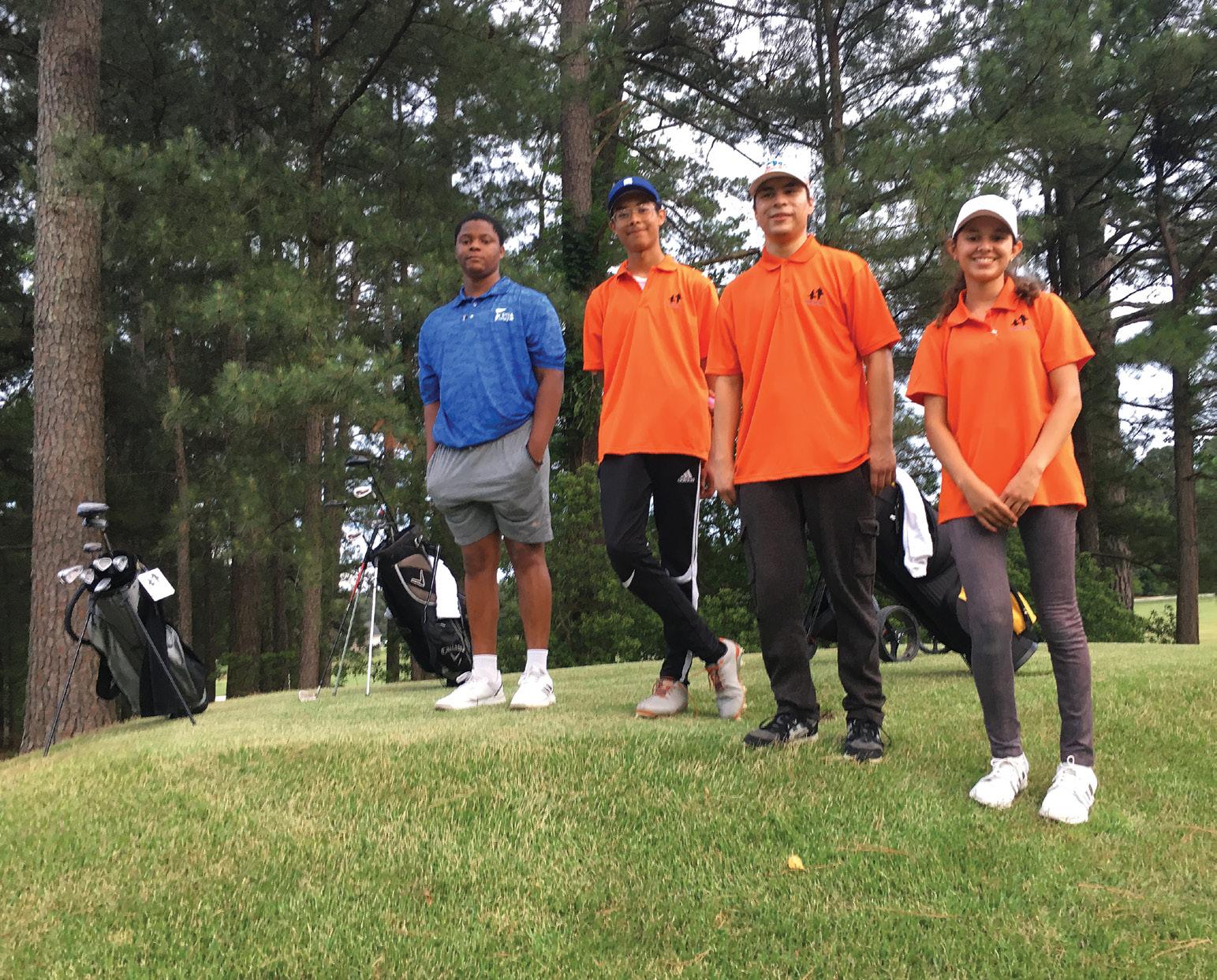

Mary Lillian Duke Biddle (1887-1960) was born in Durham, NC, the daughter of Benjamin and Sarah Duke. She graduated from Trinity College, later named Duke University in honor of her grandfather, Washington Duke. Mrs. Biddle developed an appreciation for the importance of philanthropy from her father, who was the guiding hand behind many of the Duke family’s charitable activities. Duke University, in particular, flourished in its early days thanks to the financial backing of her grandfather, father, and Uncle James B. Duke, who were successful entrepreneurs as well as philanthropists.
In September 1956, she established The Mary Duke Biddle Foundation. Mrs. Biddle directed that at least one-half of the foundation’s grants be made to Duke University and identified three churches as institutions important to her. Otherwise, she was intentionally broad in her directions to future trustees on how and where to distribute grants.
Mrs. Biddle valued the input and wisdom of her friends and trusted advisors, and, from the beginning, the foundation’s Board of Trustees has included family and non-family members. The foundation continues her practice of actively engaging members of the community to serve as trustees. Currently, the board is comprised of three family and four non-family members.
Mrs. Biddle’s vision for current and purposeful giving drives the work of the foundation’s trustees and staff. A 1910
